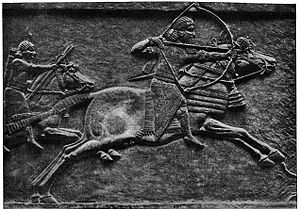അഷുർബാനിപാൽ
ആധുനിക അസ്സിറിയൻ സാമ്രാജ്യത്തിലെ (934–609 BC) അവസാനത്തെ ചക്രവർത്തിയായിരുന്നു അഷുർബാനിപാൽ (Akkadian: Aššur-bāni-apli; Aramaic: "ܐܵܫܘܿܪ ܒܵܢܝܼ ܐܵܦܠܝܼ")(668 BC – c. 627 BC).[1] നിൻവേഹിലുള്ള തന്റെ രാജകൊട്ടാരത്തിൽ കളിമൺകട്ടകളിൽ ക്യൂണിഫോം ലിപിയിൽ എഴുതിയ രേഖകളുടെ വൻശേഖരം സൃഷ്ടിച്ചതു ശ്രദ്ധേയമായ ഒന്നാണ്.[2] ഏകദേശം 20720 രേഖകളുള്ള ഈ ശേഖരത്തെ കൃത്യമായി ക്രമീകരിച്ച, ഗ്രന്ഥസൂചികളോടു കൂടിയ ആദ്യത്തെ ലൈബ്രകളിലൊന്നായി കണക്കാക്കുന്നു. ഇപ്പോൾ ഈ ശേഖരത്തെ അഷുർബാനിപാൽ ലൈബ്രറി എന്നപേരിൽ ബ്രിട്ടീഷ് മ്യൂസിയത്തിലാണ് സൂക്ഷിച്ചിരിക്കുന്നത്.
| അഷുർബാനിപാൽ | |
|---|---|
| King of Assyria | |
| ഭരണകാലം | 668 – c. 627 BC |
| Akkadian | Aššur-bāni-apli |
| Greek | Sardanapalos |
| Latin | Sardanapalus |
| ജനനം | 685 BC |
| മരണം | 627 BC |
| മുൻഗാമി | Esarhaddon |
| പിൻഗാമി | Ashur-etil-ilani |
| പിതാവ് | Esarhaddon |


അസനാപ്പർ (Asenapper)[3] എന്ന പേരിലാണ് ബൈബിളിൽ ഇദ്ദേഹത്തെ കുറിച്ച് പരാമർശിച്ചിരിക്കുന്നത്. എഴുത്തും വായനയും സ്വായത്തമാക്കിയ ആദ്യ അസ്സിറിയൻ രാജാവായിരുന്നു അഷുർബാനിപാൽ. നായാട്ട്, ശിൽപകല, കുതിരസവാരി എന്നീ മേഖലകളിൽ വെദ്ധഗ്ദനായിരുന്ന അഷുർബാണപാൽ എണ്ണ ഘനനത്തിനുള്ള[അവലംബം ആവശ്യമാണ്] സ്ഥാനനിർണ്ണയം നടത്തുന്നതിലും മികവു കാണിച്ചിരുന്നു.[4]
അവലംബം
തിരുത്തുക- ↑ These are the dates according to the Assyrian King list, Assyrian kinglist
- ↑ Ashurbanipal from the Encyclopædia Britannica
- ↑ See other versions at Ezra 4:10
- ↑ Marcus Junianus Justinus. "Epitome of the Philippic History of Pompeius Trogus".
His successors too, following his example, gave answers to their people through their ministers. The Assyrians, who were afterwards called Syrians, held their empire thirteen hundred years. The last king that reigned over them was Sardanapalus, a man more effeminate than a woman.
Sources
തിരുത്തുക- Barnett, R. D. (1976). Sculptures from the North Palace of Ashurbanipal at Nineveh (668–627). London: British Museum.
- Grayson, A. K. (1980). "The Chronology of the Reign of Ashurbanipal". Zeitschrift für Assyriologie. 70 (2): 227–245. doi:10.1515/zava.1980.70.2.227.
- Luckenbill, Daniel David (1926). Ancient Records of Assyria and Babylonia: From Sargon to the End. Vol. 2. Chicago: University of Chicago Press.
- Murray, S. (2009). The Library: An Illustrated History. New York, NY:: Skyhorse Pub.
{{cite book}}: CS1 maint: extra punctuation (link) - Oates, J. (1965). "Assyrian Chronology, 631-612 B.C". Iraq. 27 (2): 135–159. doi:10.2307/4199788.
- Olmstead, A. T. (1923). History of Assyria. New York: Scribner.
- Russell, John Malcolm (1991). Sennacherib's Palace without Rival at Nineveh. Chicago: University of Chicago Press.
അധിക വായനക്ക്
തിരുത്തുക- Ito, Sanae (2015). Royal Image and Political Thinking in the Letters of Assurbanipal. Ph.D. thesis. Helsinki: University of Helsinki. ISBN 978-951-51-0972-9.
പുറത്തേക്കുള്ള ലിങ്കുകൾ
തിരുത്തുക- Ashurbanipal Archived 2007-09-30 at the Wayback Machine.
- The Library of King Ashurbanipal Web Page Archived 2008-07-09 at the Wayback Machine.
- Assurbanipal Coronation Hymn
- History Of Assurbanipal, Translated from the Cuneiform Inscriptions by George Smith
- Historical Prism Inscriptions of Ashurbanipal I: Editions E, B1–5, D, and K – Oriental Institute Archived 2012-03-19 at the Wayback Machine.
- Geldings for the Gods Archived 2016-06-01 at the Wayback Machine. and the origine in life are Greece and the myth of Greece and Greek people